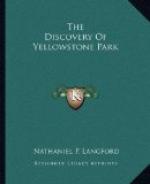A new roster was made up, and I question if there was ever a body of men organized for an exploring expedition, more intelligent or more keenly alive to the risks to be encountered than those then enrolled; and it seems proper that I here speak more specifically of them.
Gen. Henry D. Washburn was the surveyor general of Montana and had been brevetted a major general for services in the Civil War, and had served two terms in the Congress of the United States. Judge Cornelius Hedges was a distinguished and highly esteemed member of the Montana bar. Samuel T. Hauser was a civil engineer, and was president of the First National Bank of Helena. He was afterwards appointed governor of Montana by Grover Cleveland. Warren C. Gillette and Benjamin Stickney were pioneer merchants in Montana. Walter Trumbull was assistant assessor of internal revenue, and a son of United States Senator Lyman Trumbull of Illinois. Truman C. Everts was assessor of internal revenue for Montana, and Nathaniel P. Langford (the writer) had been for nearly five years the United States collector of internal revenue for Montana, and had been appointed governor of Montana by Andrew Johnson, but, owing to the imbroglio of the Senate with Johnson, his appointment was not confirmed.
[Illustration: James Stuart.]
While we were disappointed in our expectation of having James Stuart for our commander and adviser, General Washburn was chosen captain of the party, and Mr. Stickney was appointed commissary and instructed to put up in proper form a supply of provisions sufficient for thirty (30) days, though we had contemplated a limit of twenty-five (25) days for our absence. Each man promptly paid to Mr. Stickney his share of the estimated expense. When all these preparations had been made, Jake Smith requested permission to be enrolled as a member of our company. Jake was constitutionally unfitted to be a member of such a party of exploration, where vigilance and alertness were essential to safety and success. He was too inconsequent and easy going to command our confidence or to be of much assistance. He seemed to think that his good-natured nonsense would always be a passport to favor and be accepted in the stead of real service, and in my association with him I was frequently reminded of the youth who announced in a newspaper advertisement that he was a poor but pious young man, who desired board in a family where there were small children, and where his Christian example would be considered a sufficient compensation. Jake did not share the view of the other members of our company, that in standing guard, the sentry should resist his inclination to slumber. Mr. Hedges, in his diary, published in Volume V. of the Montana Historical Society publications, on September 13th, thus records an instance of insubordination in standing guard:
Jake made a fuss about his turn, and Washburn
stood
in his place.
Now that this and like incidents of our journey are in the dim past, let us inscribe for his epitaph what was his own adopted motto while doing guard duty when menaced by the Indians on the Yellowstone:




